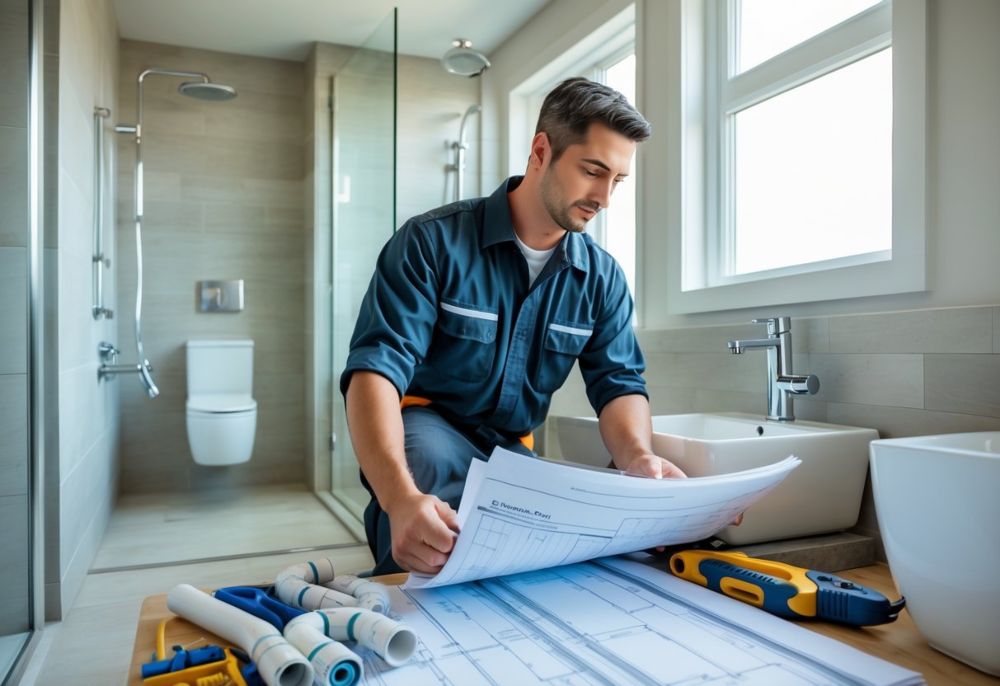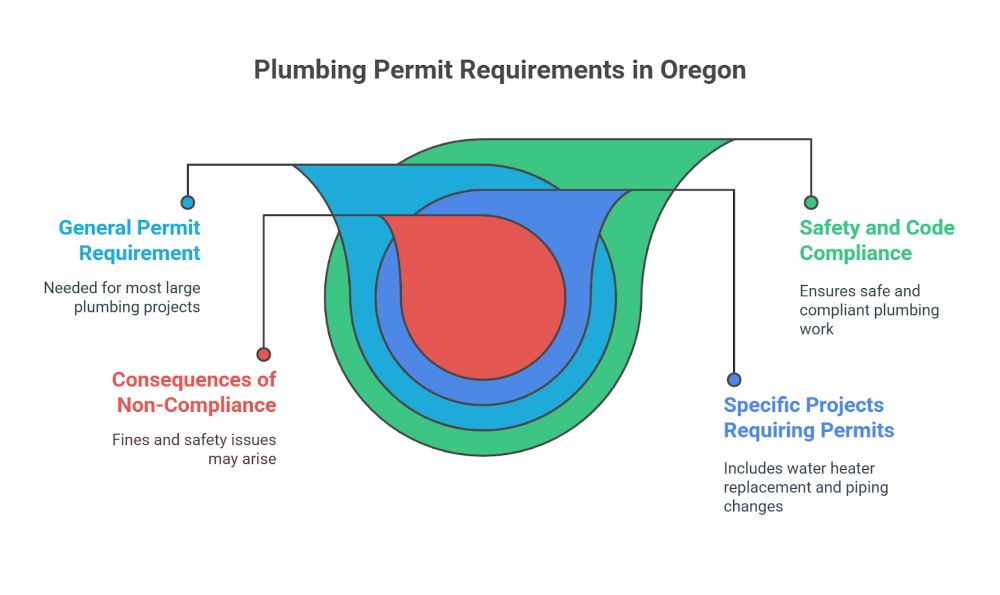

Date Posted: June 20, 2025 11:43 am

Oregon’s plumbing codes change over time, and homeowners in 2025 face new rules and requirements that are important to understand before starting any project.
Knowing the basics of Oregon’s plumbing regulations can help homeowners prevent costly mistakes and avoid common problems during remodels or repairs.
Whether someone owns a newer home or a classic Portland house, learning when permits are needed and what work can be done without a licensed professional will save time and money.
Plumbing codes are based on statewide standards that cover everything from the installation of pipes to the types of water-saving fixtures required.
Following Oregon’s Plumbing Specialty Code is not just about staying legal—it also means protecting your home and making sure work passes inspection.
With stricter water conservation rules and updates to what is allowed in greywater systems, 2025 brings changes that every property owner should be aware of.

Oregon has its regulations for plumbing work, but these regulations are based on national standards and are regularly updated.
City and state rules sometimes differ, especially in places like Portland.
Key changes in 2025 affect both residential and commercial plumbing projects.
Oregon’s plumbing laws follow the Uniform Plumbing Code (UPC), but with local adjustments.
The state uses the UPC as a base model, then makes changes to suit local needs, climate, and building styles.
The Oregon Building Codes Division handles these changes in consultation with experts and the State Plumbing Board.
Every city, including Portland, must follow Oregon’s main code, known as the Oregon Plumbing Specialty Code (OPSC), but cities can add their code guides.
Portland, for instance, utilises additional guidelines to assist homeowners and contractors in understanding and complying with the rules in unique situations.
Homeowners should be aware that these rules apply to the installation, repair, and any modifications to plumbing systems in their homes.
It is essential to consult with local officials before commencing any work, as regulations may vary depending on the location or project type.
The 2025 Oregon plumbing code update includes new safety measures, water-saving requirements, and updated materials lists.
These updates aim to make plumbing safer and more efficient for both new and older homes.
Some important differences from past years include stricter standards for pipe insulation and hot water systems.
Homeowners will also see clearer rules about fixture placement and pipe sizing.
Cities like Portland often have code guides that explain these changes and offer simple solutions for meeting the updated code.
The residential building code also now covers modern plumbing methods and sets clearer expectations for permits and inspections.

Homeowners planning plumbing projects in Oregon should be aware of when a permit is required by law and when simple repairs can be made without one.
Permits help make sure work is safe, up to code, and inspected by professionals.
Most large or complicated plumbing jobs need a permit in Oregon.
Projects that require a permit include:
Permits are also needed if someone is moving or changing any part of the system that connects to drinking water or drains.
This applies to both professional plumbers and homeowners doing their work.
Performing these jobs without a permit may result in fines, difficulties selling a house, or safety hazards.
Oregon allows for some basic plumbing repairs to be made without a permit.
These are referred to as “ordinary minor plumbing repairs.”
Examples include:
A permit is not required if the repair does not involve cutting into walls, floors, or ceilings and does not alter piping layouts.
If a pipe is leaking behind a wall and more than five feet of new pipe is needed, a permit will be required.
For a detailed description of what is considered exempt, see the official rules at OAR 918-780-0035.
Always check with your local plumbing department to determine if you need a permit.
Modern Plumbing helps homeowners stay compliant with Oregon’s permit laws, including fast, code-approved water heater installations that meet current state safety standards. Contact us today to schedule your installation.
If you’re ready to get started, call us now!
Homeowners in Oregon need to understand the difference between projects that can be done as a do-it-yourself (DIY) project and those that legally require a licensed plumber.
Choosing the right approach helps protect safety and property and ensures that local code requirements are met.
Oregon law imposes strict limitations on the plumbing work that homeowners can perform themselves.
Only the owner of a single-family home who also uses it as their primary residence is allowed to perform certain basic plumbing tasks.
Even then, all work must adhere to the rules set by the Oregon State Plumbing Board. Examples of allowable DIY plumbing projects include:
Work that involves new plumbing lines, moving pipes, changing drain lines, or connecting to the main water supply almost always requires the services of a licensed plumber.
Permits may be required even for minor jobs, and failing to get permits can result in heavy fines.
If the house is a rental or meant for sale, homeowners are not allowed to perform even simple plumbing repairs.
Oregon code is clear that almost all major plumbing work must be done by someone holding a valid state license.
A licensed plumber in Oregon must pass exams, demonstrate experience, and adhere to strict state and local building codes.
This ensures that all work is safe, up to standard, and inspected as required.
Hiring an unlicensed contractor or attempting illegal DIY work can pose significant risks to homeowners.
For example, unlicensed work often skips important safety checks and may void a homeowner’s insurance policy if something goes wrong.
If accidents or water damage occur, the homeowner may be required to pay out of pocket for repairs.
Most unlicensed contractors also lack proper insurance, leaving the property owner responsible for any injuries or damages that may occur.
There are also legal issues: Oregon law requires a licensed plumber for most jobs exceeding a specified value, and homeowners may face fines or lawsuits if the code is not followed.
Violating these rules can slow down sales or remodels, as unapproved plumbing work may not pass inspection.
Homeowners in Oregon are required to follow state plumbing codes when remodeling kitchens or bathrooms.
Key rules apply to fixture spacing, venting needs, drain sizing, and water heater safety measures.
Oregon requires specific distances between plumbing fixtures in a remodel.
Toilets must have at least 15 inches of clearance from the center of the bowl to the side walls or other fixtures, and 24 inches of clear space in front.
Sinks usually require a minimum of 21 inches of clearance in front for access. Showers must have a minimum of 30 inches by 30 inches inside.
For bathrooms, the Oregon code includes setback rules. Water closets and bidets need clear floor space. Light switches and outlets must be installed safely away from water.
In kitchens, dishwashers and sinks must have enough space around them for safe use and cleaning.
Every fixture must be connected to an approved water supply line and drain.
Proper rough-in requirements ensure that drain and supply pipes are precisely located within the wall framing.
All installations must comply with the current Oregon Plumbing Specialty Code.
Venting systems in Oregon help prevent sewer gases from entering living areas. Each plumbing fixture must have a vent pipe that provides proper airflow.
In most cases, kitchen and bathroom drains cannot share the same vent unless specific guidelines are met.
Drains must be sized to match fixture units, as specified in Oregon’s plumbing code.
For example, a bathroom sink typically uses a 1 1/4-inch drain, while tubs and showers usually require 1 1/2-inch or larger pipes.
Horizontal pipe runs have set maximum lengths, allowing wastewater to flow freely without clogs.
Water heaters are subject to specific installation rules in Oregon. These include the placement of pressure relief valves, seismic strapping, and approved venting.
Following these laws helps keep remodeled spaces safe and up to code.
Oregon law permits the reuse of greywater under specific conditions and requires all plumbing fixtures to meet certain efficiency standards.
Homeowners must comply with both plumbing codes and environmental regulations to use and conserve water in their homes in a legally compliant manner.
Greywater is wastewater from showers, bathtubs, bathroom sinks, and laundry.
In Oregon, residents can use greywater for non-potable purposes such as irrigating landscapes and flushing toilets.
Permits are required to construct or operate a greywater reuse system.
The Oregon Department of Environmental Quality (DEQ) oversees this process and establishes limits to ensure the safety of people and water supplies.
Homeowners must make sure excess or unsuitable greywater is diverted to an approved sewer or septic system.
All systems must meet the standards outlined in Oregon Administrative Rules Chapter 340, Division 53. Only graywater suitable for beneficial purposes can be reused.
All new and replaced plumbing fixtures in Oregon must comply with the Uniform Plumbing Code (UPC), along with Oregon’s stricter amendments.
These rules establish maximum flow rates for toilets, faucets, and showers to conserve water and minimize waste.
A few of the most important requirements include:
Some products may need to be third-party tested or certified to meet these standards.
When installing or replacing fixtures, homeowners must verify that all products comply with current codes, as outlined in Oregon’s plumbing specialty code documents.
If you’re remodeling your kitchen or bath, Modern Plumbing ensures every plumbing rough-in follows Oregon’s latest spacing and drainage code requirements. Avoid inspection delays—schedule a walkthrough with us today.
If you’re ready to get started, call us now!
Oregon homeowners often face issues during plumbing inspections. Small mistakes or outdated work can lead to serious problems that must be corrected to comply with state regulations.
Oregon plumbing inspections often turn up violations that could have been avoided.
One of the most common problems is using the wrong size or type of pipe for drains.
If the drainage piping is too small for the fixture, it may clog or back up and will not meet state code requirements.
Another frequent violation is improper venting.
Traps called “S-traps,” which don’t provide proper venting, are no longer allowed and will cause a home to fail an inspection.
Using plastic piping where metal is required or using materials not rated for potable water is also a frequent issue.
Incorrect installation of water heaters or failure to include a safety relief valve can be dangerous and is strictly prohibited.
Oregon rules require missing identification labels on potable water pipes and will be flagged during an inspection.
The best way to avoid common plumbing code violations in Oregon is to stay updated with current building codes.
Homeowners should always use pipes, fittings, and fixtures approved by the state.
Before starting any project, reading the latest code or consulting with a licensed plumber can prevent major mistakes.
Hiring a certified plumber is generally safer than attempting to do it yourself.
They are expected to be familiar with the latest requirements.
For example, always check that venting is correct for each fixture and that all pipes are clearly labeled for drinking water use. Using proper pipe size and materials for the job is key.
Ensuring that even small details, such as relief valves on water heaters, are installed according to law will help projects pass Oregon plumbing inspections.
Modern plumbing in Oregon strives to keep homes safe, efficient, and compliant with local codes.
Homeowners who follow local plumbing standards can prevent costly problems and ensure compliance with state laws for repairs and upgrades.
Getting a permit is often required before starting plumbing work in Oregon.
Obtaining the correct permits ensures that the work complies with the Oregon Plumbing Specialty Code and local regulations.
This process protects homeowners against future fines or forced repairs.
Once the work begins, inspections are an important step.
Inspectors verify that all plumbing matches approved plans and meets current safety standards.
If something is not up to code, it must be fixed before the project is finished.
For code-compliant plumbing upgrades in Oregon, sticking to this process is crucial.
Licensed plumbers often provide warranties on their work.
Warrantied work provides peace of mind, as the plumber is responsible for any issues that may arise, ensuring repairs are covered.
Choosing professionals also means projects are more likely to comply with state laws and pass inspection.
Homeowners in Oregon and SW Washington have access to plumbing companies that focus on up-to-code solutions.
These companies are familiar with local amendments to the Uniform Plumbing Code.
Their teams are familiar with the specific requirements in each area.
Services often include:
By working with pros who serve both regions, homeowners can avoid delays and costly mistakes.
These companies handle both legal and technical aspects of code-compliant plumbing upgrades in Oregon.
Modern Plumbing handles every step of re-piping projects, from permits to final inspection, ensuring your system meets Oregon plumbing codes without the stress. Contact us now to schedule your code-compliant upgrade.
What plumbing work requires a permit in Oregon?
Plumbing work in Oregon typically requires a permit if it involves installing or altering water, drain, waste, or vent systems. This includes re-piping, water heater installation, and the addition of new fixtures. Simple repairs, such as faucet replacements, usually do not require permits.
Can homeowners do their own plumbing in Oregon?
Yes, Oregon homeowners can do plumbing on their primary, detached residence if they occupy it. However, all work must follow the Oregon Plumbing Specialty Code and may still require permits and inspections.
What is the current Oregon plumbing code based on?
Oregon’s current plumbing code is based on the 2021 Uniform Plumbing Code (UPC) with state-specific amendments. These codes are adopted and enforced by the Oregon Building Codes Division (BCD).
Do I need a permit to replace a water heater in Oregon?
Yes. Replacing a water heater in Oregon requires a plumbing permit and following specific installation standards for pressure relief, seismic strapping, and venting.
Are greywater systems legal in Oregon?
Yes, residential greywater systems are legal in Oregon under OAR 340-053. Homeowners must meet system design, treatment, and usage requirements, and may be required to obtain a permit depending on the system’s complexity.
What are the most common plumbing code violations in Oregon homes?
Common violations include unvented drains, improper pipe slope, missing cleanouts, and the use of non-code-approved fittings or materials. These issues can lead to inspection failures and costly rework.
Who enforces plumbing code compliance in Oregon?
Local building departments and the Oregon Building Codes Division enforce plumbing compliance with plumbing codes, ensuring that all permitted plumbing work meets the Oregon Plumbing Specialty Code.